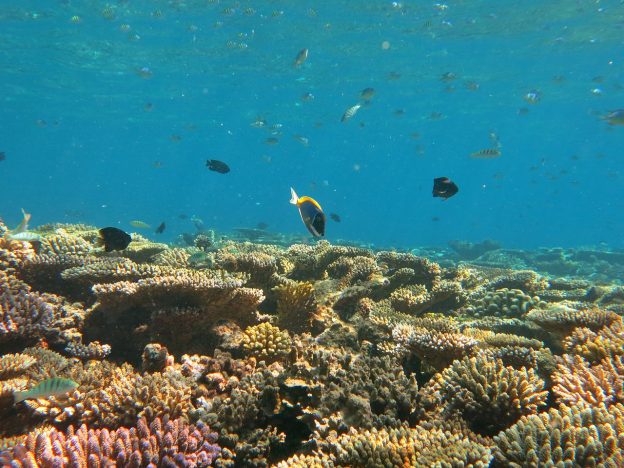The Maldives is reeling from the impact of India’s actions to discourage tourism, severely undermining the nation’s economy. This backlash comes in response to Prime Minister Muizzu’s vocal anti-India stance and alignment with China. Now, the Maldives faces significant financial strain, prompting a desperate search for investment.
Amidst these economic challenges, the Maldives’ ambitious land reclamation projects in Hulhumalé, designed to combat rising sea levels, are stalling due to a lack of funding. These lagoons are intended not only to mitigate threat by rising sea level on Maldives cities, but also to attract investors for resort development, thus boosting tourism. However, the Maldives claims to have paused these initiatives due to coral bleaching. In truth, the real issue is their constrained budget.
At the upcoming UN conference, the Maldives will appeal to the international community for financial support for Small Island Developing States (SIDS). The irony here is glaring: the Maldives is leveraging environmental concerns to secure funding for projects like land reclamation, which ironically worsen environmental problems. This blatant hypocrisy underscores a troubling reality—the Maldives’ developmental ambitions, though cloaked in environmental rhetoric, risk exacerbating the very climate issues they purport to address. It’s time for a more honest and sustainable approach to both economic development and environmental preservation.
On May 9, the Environmental Protection Agency (EPA) took decisive action of halting all dredging, reclamation, and sand pumping activities until June 10 in Maldives. This order aims to alleviate the immense stress human activities have imposed on the coral reefs, giving them a chance to recover from bleaching and build resilience against future climate disruptions. The Maldives, an archipelago of 1,192 islands, is under existential threat from climate change. These islands, barely a meter above sea level, face increasing peril from rising sea levels. President Dr. Mohamed Muizzu, in an op-ed for the U.K.’s Guardian, highlighted the current impacts of the climate crisis, including record-breaking temperatures and increasingly powerful storms.
However, the reality is that Maldives is grappling with severe economic repercussions due to India’s recent efforts to discourage tourism. These actions have dealt a significant blow to the Maldivian economy, which heavily relies on tourism, especially from India as a primary source of revenue. This downturn is a direct response to Maldives Prime Minister Muizzu’s outspoken anti-India rhetoric and his growing coziness with China. As a result, the Maldives finds itself in a precarious financial situation, struggling to maintain economic stability. The country is now in a desperate scramble to attract new investments to mitigate the financial strain and revive its tourism sector. The urgency to secure funding has never been more critical, as the nation looks for ways to bolster its economy amidst these challenging times.
Muizzu would be advocating for funds for Small Island Developing States (SIDS) at an upcoming U.N. conference, to support climate resilience. However, his rhetoric about environmental stewardship rings hollow given the ongoing land reclamation projects in Maldives. Muizzu showcased Hulhumalé, a reclaimed artificial island elevated two meters above sea level, as a model for adaptation. This so-called adaptation involves dredging sand from the ocean floor, an act that severely disrupts marine ecosystems. Land reclamation is a process of creating usable space, is an environmental catastrophe. Dredging decimates coral reefs and marine habitats, and the reclaimed land often suffers from instability and flooding. The pollution from construction and the introduction of invasive species further compounds the environmental damage. Environmental groups have rightly condemned widespread reclamation as “ecocide,” a term reflecting the irreversible destruction it causes.
Successive Maldivian governments have feebly attempted to justify reclamation by citing the need for housing, infrastructure, and safer, elevated ground. These justifications have failed to convince environmentalists. The stark reality is that these projects are less about survival and more about catering to luxury tourism. David R. Boyd, the U.N. Special Rapporteur, succinctly captured the dilemma: the Maldives is engaged in action that cause environmental damage because of land reclamation, driven by the lure of tourism dollars.
Muizzu’s claims of environmental stewardship are further undermined by the continuation of reclamation projects despite the EPA’s suspension order. A glaring example is the $343 million resort project by Qatar’s Estithmar Holding, which was granted a special permit to bypass the suspension. This blatant disregard for environmental regulations in favor of luxury resort development is a testament to the government’s misplaced priorities.
The Maldives’ tourism industry is now shifting towards integrated multi-resort destinations on reclaimed islands, a trend that exacerbates the environmental crisis. While Muizzu may praise the decision to pause development projects, the reality is that these pauses are temporary and selectively enforced. The EPA is currently investigating reports of noncompliance with the suspension order, highlighting the ongoing struggle between environmental conservation and economic exploitation.
In sum, the Maldives’ approach to climate adaptation is deeply flawed. The government’s focus on land reclamation for tourism under the guise of environmental stewardship is not only hypocritical but also detrimental to the very ecosystems that use make the Maldives a unique destination.








